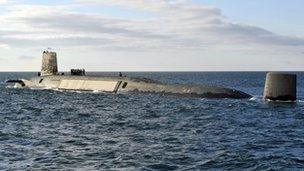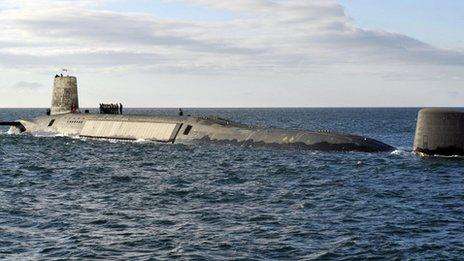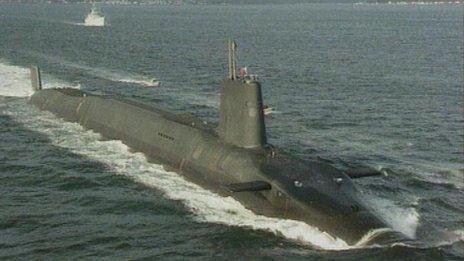Trident: Reducing nuclear fleet would be reckless, says Hammond
- Published

The replacements for the Vanguard submarines could take 17 years to build
Reducing the number of submarines carrying Trident ballistic missiles would be "reckless", Philip Hammond has said on the eve of a report into the future of the UK's nuclear deterrent.
The defence secretary said downsizing the submarine fleet from the current four boats would amount to a "part-time deterrent" and would not save money.
A review into alternatives to the UK weapons system is published on Tuesday.
The Lib Dems insisted on the study amid disagreements with the Conservatives.
The UK has had a continuous at-sea nuclear deterrent - with at least one submarine on patrol at any given time - for more than 40 years and has used the Trident system since the early 1980s.
'Strike first'
The Vanguard submarine fleet will reach the end of its lifespan in the 2020s and a final decision on whether to renew it has been delayed until 2016 amid differences between the coalition partners.
The Conservatives, who support like-for-like renewal, and the Lib Dems - who have long been sceptical - agreed to a value for money review to look into other options, including alternative delivery systems and a slimmed-down version of the current system.
The Lib Dems insist the review will offer alternatives based on a "credible" deterrent but one no longer predicated on a "Cold War posture".
But writing in the Daily Mai, externall, Mr Hammond said all possible alternatives to Trident would be "less capable, less credible and more expensive" and would not provide the same "level of protection" from external aggression.
"There will be those who seek to use this review to argue that, even if we continue with Trident, we can downgrade to a part-time deterrent - claiming that our potential adversaries will always give us months of advance warning of an intention to strike.
"I believe that taking such a risk would be reckless."
Any suggestion the UK was "letting down its guard", he argued, would send the wrong signal at a time when Iran was seeking to acquire nuclear weapons and other military powers, such as Russia, were spending billions on upgrading their military capability.
Critics have questioned whether the UK can continue to pay for Trident in its current form. The government estimates renewal costs will be between £15bn and £20bn but anti-nuclear campaigners say the figure will be much higher.
'Moral leadership'
But Mr Hammond said building three rather than four submarines would save just 0.17% of the UK's total defence budget.
"Reducing our fleet of nuclear armed submarines and making our deterrent part-time, would be a false economy. The cost savings would be minuscule compared to the erosion of our national security and the threat to our submarine-building industry."
Any reduction in submarine numbers would leave the UK vulnerable, he suggested, as routine maintenance, equipment failure or a lack of crew could mean the deterrent "may not be available when it is needed".
There was a risk, he added, that "an adversary would be tempted to strike first at our deterrent while it is sitting in its home port, knowing that we have no submarines at sea that could respond".
Tuesday's review will not have any direct impact on the policy of the coalition government, which affirmed its commitment to Trident in its programme for government in 2010.
But it will inform debate on future spending priorities and on Lib Dem policy in the run-up to the next election.
The Campaign for Nuclear Disarmament said cancelling Trident would bring "strategic and economic benefits" and for the government not to consider this seriously would be an "abdication of responsibility".
Publishing an alternative review, external, which it says has the backing of a number of Lib Dem and Labour MPs, its general secretary Kate Hudson said not proceeding could save £100bn and give the UK "moral leadership" in global disarmament talks.
"The decision on whether or not to replace Trident should be made on national security grounds," she said. "The reality is it doesn't address current or foreseeable security concerns.
"In fact it exacerbates nuclear proliferation and contributes to global insecurity. Whether it is this government or the next that realises it, it's clear that it is time to scrap Trident."

- Published23 May 2017

- Published30 June 2013

- Published19 May 2011